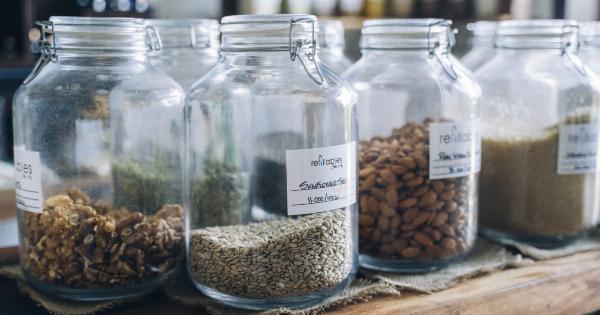Eating organic foods has become increasingly popular in recent years, as people are becoming more conscious about their health and the environment.
Organic foods are cultivated without the use of synthetic pesticides, herbicides, or fertilizers, and are free from genetically modified organisms (GMOs). By incorporating organic foods into your diet, you can reap numerous health benefits and support sustainable farming practices. Here are ten of the best organic foods that you should consider incorporating into your diet:.
1. Organic Fruits
Organic fruits are a fantastic choice for anyone looking to improve their overall health. Not only are they packed with essential vitamins and minerals, but they also contain higher levels of antioxidants compared to conventionally grown fruits.
Some popular organic fruits include apples, bananas, oranges, strawberries, and blueberries. Consuming organic fruits ensures that you are not exposed to harmful pesticides commonly used in conventional fruit farming.
2. Organic Vegetables
Organic vegetables are another essential component of a healthy diet. They are rich in fiber, vitamins, and minerals, which are vital for maintaining overall health.
Incorporating a variety of organic vegetables into your meals can help prevent chronic diseases and promote optimal digestion. Examples of organic vegetables include broccoli, spinach, kale, carrots, and bell peppers.
3. Organic Grains
Switching to organic grains can significantly improve your diet’s nutritional value. Organic whole grains, such as quinoa, brown rice, oats, and wheat, are excellent sources of fiber, antioxidants, and essential nutrients.
These grains also provide sustained energy and can help regulate blood sugar levels. By choosing organic grains, you avoid the potential risks associated with consuming genetically modified and pesticide-laden conventional grains.
4. Organic Dairy Products
If you consume dairy products, opting for organic options is highly recommended. Organic milk, cheese, and yogurt come from cows that are fed organic feed and are not treated with synthetic hormones or antibiotics.
These products are also free from harmful pesticides and contain higher levels of beneficial omega-3 fatty acids. Organic dairy products can provide essential nutrients like calcium, vitamin D, and protein without the risk of added hormones or antibiotics.
5. Organic Poultry and Eggs
When it comes to poultry and eggs, organic is the way to go. Organic chickens are raised without the use of antibiotics, synthetic hormones, or genetically modified feed. Their diet consists of organic grains and allows them to roam freely.
Organic eggs come from hens that are fed an organic diet and are not subjected to crowded or unnatural living conditions. These organic poultry and eggs are higher in omega-3 fatty acids and other essential nutrients compared to conventional alternatives.
6. Organic Lean Meats
For meat lovers, choosing organic lean meats is a healthier option. Organic meats come from animals that are raised on organic feed and are not given antibiotics or hormones. They are also free from artificial preservatives and additives.
Opting for organic lean meats, such as organic chicken breast, grass-fed beef, and organic turkey, provides higher levels of beneficial fatty acids and essential nutrients while minimizing exposure to potentially harmful substances.
7. Organic Legumes
Organic legumes are an excellent addition to any organic diet. Legumes, such as beans, lentils, and chickpeas, are a great source of plant-based protein, fiber, and essential minerals. They are also low in fat and help regulate blood sugar levels.
Incorporating organic legumes into your meals can provide numerous health benefits, including supporting heart health and aiding in weight management.
8. Organic Nuts and Seeds
Nuts and seeds are a nutritional powerhouse, and choosing organic varieties can further enhance their benefits.
Organic nuts and seeds, such as almonds, walnuts, chia seeds, and flaxseeds, are packed with healthy fats, protein, fiber, and various vitamins and minerals. They make for a convenient and nutritious snack option or an excellent addition to salads, smoothies, or baked goods.
9. Organic Herbs and Spices
Organic herbs and spices not only add flavor to your meals but also provide additional health benefits. Organic herbs like basil, thyme, rosemary, and oregano are rich in antioxidants and have anti-inflammatory properties.
Organic spices such as turmeric, cinnamon, ginger, and garlic powder have been used for centuries for their medicinal properties. By choosing organic herbs and spices, you can enhance your meals while avoiding exposure to synthetic pesticides or additives.
10. Organic Tea and Coffee
Many people enjoy a cup of tea or coffee to start their day, and opting for organic varieties can provide added benefits. Organic tea and coffee are free from synthetic pesticides and are cultivated using sustainable farming practices.
Organic green tea, black tea, herbal teas, and organic coffee are rich in antioxidants and can improve cognitive function, boost metabolism, and support overall well-being.
Incorporating these ten organic foods into your diet can have a profound impact on your health and well-being.
By consuming organic options, you not only protect your body from harmful substances but also support sustainable and eco-friendly farming practices.




























